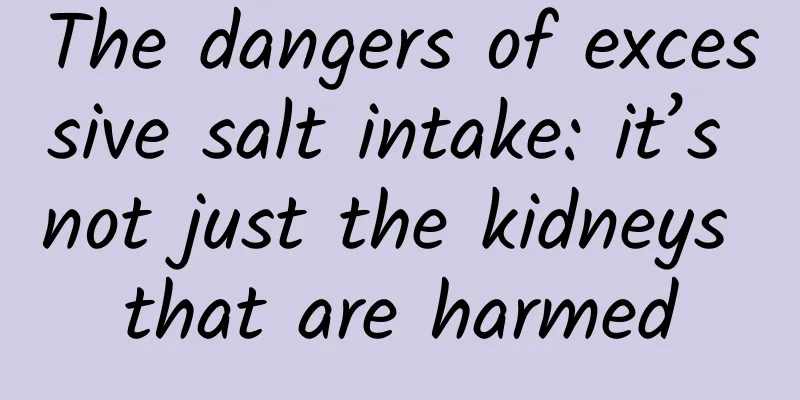The dangers of excessive salt intake: it’s not just the kidneys that are harmed

|
01. Damage to blood vessels: Sodium regulates human body functions. Excessive intake will increase blood pressure, damage vascular endothelial cells, and cause vascular stenosis. 02. Damage to the heart: Excessive salt can cause heart disease, cause water to enter cells, and increase the burden on the heart. 03. Damage to bones: Eating too much salt will cause the kidneys to excrete calcium ions when excreting sodium ions, leading to calcium loss and causing osteoporosis. 04. Damage to the skin: Excessive salt destroys the osmotic pressure, causing the skin to be dehydrated, rough, and increase wrinkles and spots. 05. Damage to the stomach and intestines: High salt and related foods damage the gastric mucosa and are a high-risk factor for gastric cancer. |
<<: How far is Viagra from being able to treat Alzheimer's disease?
>>: [Northern Xinjiang Science] These 10 habits are good for your heart
Recommend
Take medicine to induce abortion for 20 days. Why is there a little blood?
Medical abortion mainly achieves the effect of ab...
What should I do if a pregnant woman has a fast heartbeat?
During pregnancy, women's hormones are consta...
Why are my periods getting less and less frequent?
Menstruation is a normal physiological phenomenon...
SquareTrade: iPad mini tops list of most fragile devices
SquareTrade, a third-party analysis agency in Eur...
Can uterine fibroids disappear on their own?
In life, many women suffer serious damage to thei...
What kind of beer is easy to get drunk? Can I drink beer that has been left overnight?
Since 3000 BC, Egyptians have started to use bitt...
Can I eat egg pancakes during menstruation?
Can you eat omelet during menstruation? To know t...
How to take care of your skin for women in their forties
The skin is the largest organ in our human body. ...
How to treat oral ulcers in women?
Oral ulcers are a relatively common symptom. Ther...
Is it safe to have sex on the third day after your period?
Many people do not want to have children but feel...
Can pregnant women eat dried persimmons?
Persimmon cakes are loved by many people. The tas...
I got pregnant the same month I used the gel
I used antibacterial gel this month of pregnancy....
What should I do if the breast pump does not produce milk?
Nowadays, pregnant women usually prepare a breast...
How did Jia Baoyu get the jade in Dream of the Red Chamber? Why didn't Jia Baoyu see Xue Baochai for the last time?
Jia Baoyu and Lin Daiyu grew up together, and the...









